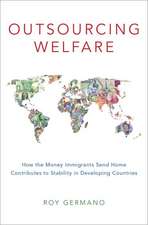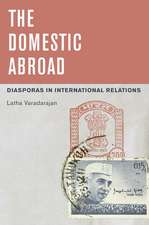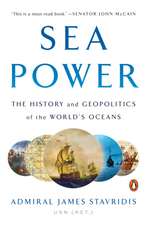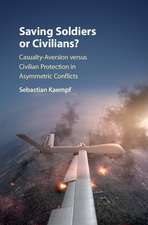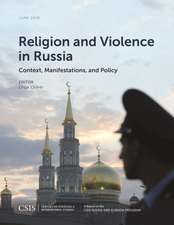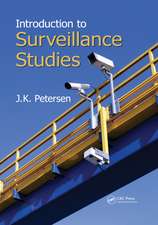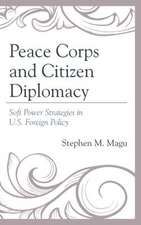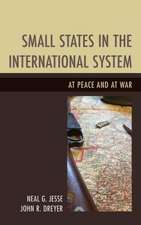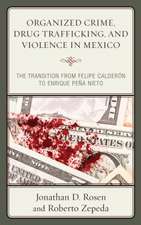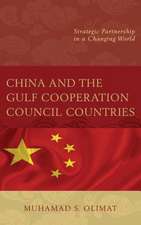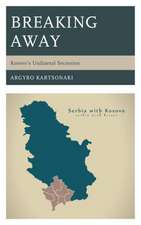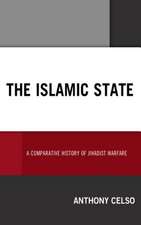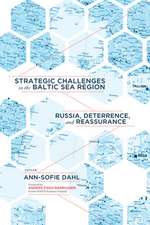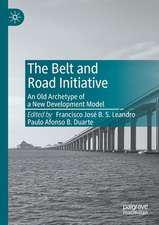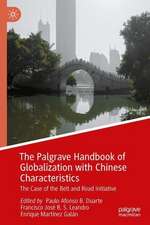Portugal and the Lusophone World: Law, Geopolitics and Institutional Cooperation
Editat de Paulo Afonso B. Duarte, Rui Albuquerque, António Manuel Lopes Tavaresen Limba Engleză Paperback – 5 mai 2024
This book responds to a serious need for a consistent and comprehensive publication which combines an analysis of Law, Geopolitics and Institutional cooperation within the Lusophone world. Research in the book includes contributions from scholars with diverse educational and professional experiences working in these disciplines, from all around the world. The book will assist readers in comprehending, recognizing and discussing on-going debates about the Lusophone world in the 21st century.
| Toate formatele și edițiile | Preț | Express |
|---|---|---|
| Paperback (1) | 816.59 lei 39-44 zile | |
| Springer Nature Singapore – 5 mai 2024 | 816.59 lei 39-44 zile | |
| Hardback (1) | 909.29 lei 6-8 săpt. | |
| Springer Nature Singapore – 4 mai 2023 | 909.29 lei 6-8 săpt. |
Preț: 816.59 lei
Preț vechi: 897.34 lei
-9% Nou
Puncte Express: 1225
Preț estimativ în valută:
156.25€ • 170.26$ • 131.67£
156.25€ • 170.26$ • 131.67£
Carte tipărită la comandă
Livrare economică 21-26 aprilie
Preluare comenzi: 021 569.72.76
Specificații
ISBN-13: 9789819904570
ISBN-10: 9819904579
Pagini: 595
Ilustrații: LIV, 595 p. 21 illus., 18 illus. in color.
Dimensiuni: 148 x 210 mm
Ediția:2023
Editura: Springer Nature Singapore
Colecția Palgrave Macmillan
Locul publicării:Singapore, Singapore
ISBN-10: 9819904579
Pagini: 595
Ilustrații: LIV, 595 p. 21 illus., 18 illus. in color.
Dimensiuni: 148 x 210 mm
Ediția:2023
Editura: Springer Nature Singapore
Colecția Palgrave Macmillan
Locul publicării:Singapore, Singapore
Cuprins
Introduction.- Part I: Legal issues and Politics within the Lusophone World.- Chapter 1. The Feasibility of the Portuguese Legal System in the Former African Colonies.- Chapter 2. The onto-anthropological foundation of Criminal Law in Brazil.- Chapter 3. Base Erosion and Profit Shifting: a view of Portugal and Brazil.- Chapter 4. Economic Law: a focus on Lusophone Competition Laws.- Chapter 5. The Role and Influence of Portuguese Law in the Macau SAR of the People’s Republic of China: Issues and Perspectives.- Chapter 6. The Pillars of Portuguese Foreign Policy: From the first globalization to the 21st century. -Chapter 7. Reframing Portuguese Foreign Policy after 1974: The Lusophone Discourse as Instrument of a Global Coloniality of Power.- Chapter 8. Portugal and China Geopolitics: Avenues to Cooperation.- Part II. The Atlantic and the Lusophone World.- Chapter 9. China, Portugal and the Atlantic: the Shifting Geopolitics, by Jorge Tavares da Silva, Paulo Afonso B. Duarteand Rui Pereira.- Chapter 10. Lusophone Connections and China’s Growing Presence in the South Atlantic.- Chapter 11. “So much sea”: opportunities and challenges in Portugal-Brazil maritime cooperation.- Chapter 12. Lusophone cooperation frameworks and the expansion of the Atlantic Maritime Security.- Chapter 13. The Spatial Development Initiatives: The Case of African Portuguese Speaking Countries.- Chapter 14. Brazil´s reach out to Africa.- Chapter 15. The nativist movement in Angola: a proposal for a modern state and society in the Lusophone context.- Chapter 16. Cabo Verde´s Geopolitical Position in the Mid-Atlantic.- Chapter 17. Mozambique Geopolitics in the Lusophone World: Challenges and Perspectives.- Chapter 18. Luso-Mozambican Diplomatic Cooperation in the Case of the Terrorist Conflict in Cabo Delgado.- Chapter 19. Lusophone Geopolitics: Blue Economy and Maritime Security in Contemporary Mozambique’s Geopolitics.- Part III. Influence and Institutional cooperation in the Lusophone World.- Chapter 20. The Geopolitics of the Portuguese Language: Knowledge and Influence.- Chapter 21. The Portuguese Science Diplomacy and EU’s External Activities with Lusophone Africa: Looking at the Co-Building Approach.- Chapter 22. The Nets that Empires Weave: The Commonwealth of Nations and the Community of Portuguese-Speaking Countries.- Chapter 23. The Soft Power of the Community of Portuguese Speaking Countries.- Chapter 24. Wavering cooperation: Portugal and Lusophone Africa at the United Nations General Assembly.- Chapter 25. Transition to a New Geopolitics of Energy: the Lusophone World.- Chapter 26. The Role of Forum Macao in the People’s Republic of China Foreign Policy.- Chapter 27. The Geopolitics of Timor-Leste: Belt & Road Initiative, ASEAN and CPLP.
Notă biografică
Paulo Duarte is an Assistant Professor at Universidade Lusófona do Porto and Invited Professor at the University of Minho.
Rui Albuquerque is a Professor at Universidade Lusófona do Porto, at the Faculty of Law and Political Science.
António Manuel Lopes Tavares is a Professor at Universidade Lusófona do Porto, at the Faculty of Law and Political Science.
Textul de pe ultima copertă
This book responds to a serious need for a consistent and comprehensive publication which combines an analysis of Law, Geopolitics and Institutional cooperation within the Lusophone world. Research in the book includes contributions from scholars with diverse educational and professional experiences working in these disciplines, from all around the world. The book will assist readers in comprehending, recognizing and discussing on-going debates about the Lusophone world in the 21st century.
Paulo Duarte is an Assistant Professor at Universidade Lusófona do Porto and Invited Professor at the University of Minho.
Rui Albuquerque is a Professor at Universidade Lusófona do Porto, at the Faculty of Law and Political Science.
António Manuel Lopes Tavares is a Professor at Universidade Lusófona do Porto, at the Faculty of Law and Political Science.
Caracteristici
Combines an analysis of Law, Geopolitics and Institutional cooperation within the Lusophone world Assesses Portugal's strategic and geopolitical role in the international context Explores Portuguese foreign policy with multilateralism and globalization

